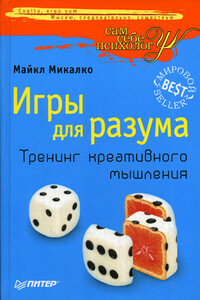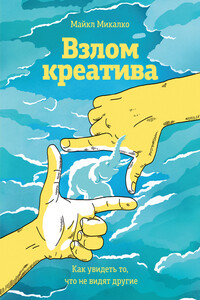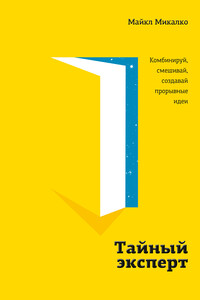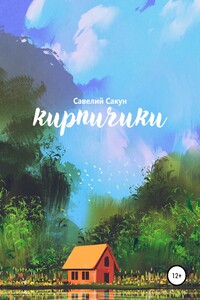Popper, Karl. The Logic of Scientific Discovery, fourteenth ed. New York: Routledge, 1996 (Поппер К. Логика научного исследования. М.: Республика, 2004).
Pyenson, Lewis. The Young Einstein. Philadelphia: IOP Pub., 1995.
Reed, S. G. Ernst, and R. Banerjii. “The Role of Transfer Between Similar Problem States.” Cognitive Psychology 6 (1974): 436–450.
Richards, Robert J. The Meaning of Evolution. Chicago: University of Chicago Press, 1992.
Rothenberg, Albert. “Artistic Creation As Stimulated by Superimposed Versus Combined-Opposite Visual Images.” Journal of Personality and Social Psychology 50 (1986): 370–381.
–, and Carl Hausman, eds. The Creativity Question. Durham, NC: Duke University Press, 1976.
–. The Etrierging Goddess: The Creative Process in Art, Science and Other Fields. Chicago: University of Chicago Press, 1989.
Runes, Dagobert, ed. The Diary and Sundry Observations of Thomas Aha Edison, reprint ed. New York: Greenwood Press, 1968.
Russell, Bertrand. Basic Writings of Bertrand Russell. New York: Simon & Schuster, 1961 (Рассел Б. Искусство мыслить. М.: Идея-пресс; Дом интеллектуальной книги, 1999).
Schapiro, Meyer. Paul Cezanne. New York: Harry N. Abrams, 1983. Senge, Peter. The Fifth Discipline. New York: Doubleday, 1990.
Seward, A. C. Darwin and Modern Science. Cambridge, MA: Cambridge University Press, 1909.
Shrady, Maria. Moments of Insight. New York: Harper & Row, 1972.
Simonton, Dean K. “Genius and Chance: A Darwinian Perspective.” In Creativity, edited by J. Brockman.
–. Scientific Genius. New York: Cambridge University Press, 1988.
–. “Emergence and Realization of Genius: The Lives and Works of 120 Classical Composers.” Journal of Personality and Social Psychology 60 (1991): 607–619.
–. “Foresight in Insight? A Darwinian Answer.” In The Nature of Insight, edited by R. J. Sternberg and J. E. Davidson. Cambridge, MA: MIT Press, 1992.
–. Greatness, Who Makes History and Why, New York: The Guilford Press, 1994.
–. Genius, Creativity and Leadership. Cambridge, MA: Harvard University Press, 1984.
Skinner, B. F. The Science of Behavior. New York: Macmillan, 1953.
Sloboda, John. The Musical Mind. New York: Oxford University Press, 1986.
Smith, S. M., and S. E. Blenkenship. “Incubation Effects.” Bulletin of the Psychonomic Society 2 (1994): 31–49.
Stager, R. A History of Psychological Theories. New York: Macmillan, 1988.
Stein, M. Stimulating Creativity, vols I and II. New York: Academic Press, 1974.
Sternberg, R. J., and J. Davidson, eds. The Nature of Insight. Cambridge, MA: MIT Press, 1994.
–. Beyond I. Q. New York: Cambridge University Press, 1984.
–. “Implicit Theories of Intelligence, Creativity and Wisdom.” Journal of Personality and Social Psychology 49 (1985): 607–677.
–, ed. The Nature of Creativity. New York: Cambridge University Press, 1988.
Suler, J. R., and J. Rizziello. “Imagery and Verbal Processes in Creativity.” Journal of Creative Behavior 21 (1987): 1–6.
Tax, S. Evolution After Darwin. Chicago: University of Chicago Press, 1960.
Taylor, C, and F. Barron, eds. Scientific Creativity. New York: Wiley.
Thagard, Paul. Mental Leaps: Analogy in Creative Thought, reprint ed. Cambridge, MA: MIT Press, 1996.
Treffinger, J., S. K. Isakesen, and R. L. Firestien. Handbook of Creative Learning, New York: Center for Creative Learning, 1982.
Tsanoff, Radoslav. The Ways of Genius. New York: Harper & Row, 1949.
Tufte, Edward. The Visual Display of Quantitative Information. Cheshire, CT: Graphics Press, 1983.
Vesari, Giorgio. Lives of the Artists. New York: Viking Penguin, 1988 (Вазари Дж. Жизнеописания наиболее знаменитых живописцев, ваятелей и зодчих. М.: Альфа-книга, 2008).
Vosniadou, Stella, and A. Ortony, eds. Similarity and Analogical Reasoning. New York: Cambridge University Press, 1989.
Wallace, Doris B., and H. E, Gruber, eds. Creative People at Work. New York: Oxford University Press, 1992.
Wallach, Michael. The Intelligence-Creativity Distinction. Morristown, NJ: General Learning Corporation, 1971.
Wallas, G. The Art of Thought. New York: Harcourt, Brace, 1926.







